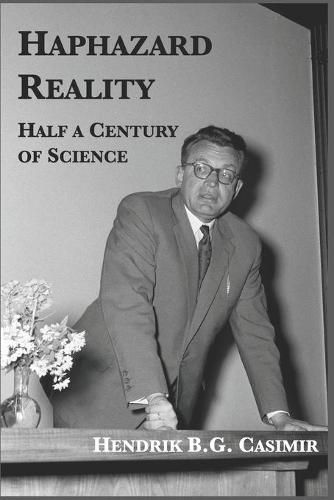Readings Newsletter
Become a Readings Member to make your shopping experience even easier.
Sign in or sign up for free!
You’re not far away from qualifying for FREE standard shipping within Australia
You’ve qualified for FREE standard shipping within Australia
The cart is loading…






Hendrik Brugt Gerhard Casimir (1909-2000), a Dutch physicist best known for his research on the two-fluid model of superconductors and the Casimir effect, studied theoretical physics under Paul Ehrenfest at Leiden University, receiving his PhD in 1931. He also spent time in Copenhagen with Niels Bohr and at ETH Zurich as an assistant to Wolfgang Pauli. In 1938, Casimir became professor of physics at Leiden University; in 1942, he moved to the Philips Natuurkundig Laboratorium in Eindhoven where he remained an active scientist until becoming its co-director in 1946 and a member of Philips’s board of directors in 1956. Casimir retired from Philips in 1972. An outstanding scientific autobiography… I remain impressed by its thoughtfulness and charm. - American Journal of Physics
[A] rich autobiography and history-of-atomic-physics… A charming, idiosyncratic, and meaningful account of events and personalities that changed physics. - Kirkus
What makes this book fascinating reading is the account of people, [Casimir’s] teachers and colleagues… The portraits given here are very perceptive and lifelike… Casimir writes with admiration and gratitude of Ehrenfest’s inspiration and guidance… There is an excellent study of Niels Bohr… Casimir talks with great frankness about his attitude to industry. - Rudolf Peierls, Nature
I myself read [this book] with fascination, meeting old friends such as Gamow, Landau, Kramers, and learning much more about them… Also in the book are character sketches of those who made physics in the Netherlands such as Lorentz, Kamerlingh Onnes and Ehrenfest, the latter remembered with the greatest affection by the author. - Sir Nevill Mott, Contemporary Physics
Haphazard Reality paints a vivid and insightful picture of the development of modern physics. - Proceedings of the American Philosophical Society
$9.00 standard shipping within Australia
FREE standard shipping within Australia for orders over $100.00
Express & International shipping calculated at checkout
Hendrik Brugt Gerhard Casimir (1909-2000), a Dutch physicist best known for his research on the two-fluid model of superconductors and the Casimir effect, studied theoretical physics under Paul Ehrenfest at Leiden University, receiving his PhD in 1931. He also spent time in Copenhagen with Niels Bohr and at ETH Zurich as an assistant to Wolfgang Pauli. In 1938, Casimir became professor of physics at Leiden University; in 1942, he moved to the Philips Natuurkundig Laboratorium in Eindhoven where he remained an active scientist until becoming its co-director in 1946 and a member of Philips’s board of directors in 1956. Casimir retired from Philips in 1972. An outstanding scientific autobiography… I remain impressed by its thoughtfulness and charm. - American Journal of Physics
[A] rich autobiography and history-of-atomic-physics… A charming, idiosyncratic, and meaningful account of events and personalities that changed physics. - Kirkus
What makes this book fascinating reading is the account of people, [Casimir’s] teachers and colleagues… The portraits given here are very perceptive and lifelike… Casimir writes with admiration and gratitude of Ehrenfest’s inspiration and guidance… There is an excellent study of Niels Bohr… Casimir talks with great frankness about his attitude to industry. - Rudolf Peierls, Nature
I myself read [this book] with fascination, meeting old friends such as Gamow, Landau, Kramers, and learning much more about them… Also in the book are character sketches of those who made physics in the Netherlands such as Lorentz, Kamerlingh Onnes and Ehrenfest, the latter remembered with the greatest affection by the author. - Sir Nevill Mott, Contemporary Physics
Haphazard Reality paints a vivid and insightful picture of the development of modern physics. - Proceedings of the American Philosophical Society